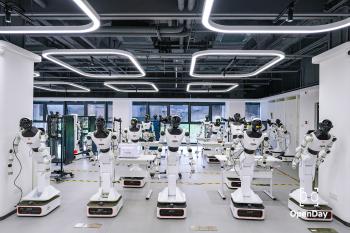AI prompts innovation boost in photonics
Artificial intelligence (AI) is significantly accelerating developments in photonics - from industrial production to medical diagnostics and environmental technology.
The combination of both technologies opens up new potential, for example for fully automated first-time-right production, imaging processes and resource-efficient data centers.
Thanks to AI, process data can be evaluated more precisely, virtual simulations can be designed more efficiently and real test cycles can be reduced. In combination with digital twins, reliable parameters for adaptive processes and closed control loops are created - a key to Industry 4.0. In laser processing in particular, this creates advances in cutting, bending, welding and quality assurance.
Neural networks make it possible to analyze large amounts of data in real time - whether in medical imaging or in the recycling of high-quality materials. AI reliably detects anomalies in CT or microscopy images, accelerates diagnostics and improves laboratory processes through automated segmentation and classification.
SMEs are also driving forward the use of AI. Companies such as Precitec and Scansonic use it for inline quality control in laser welding. Sensors provide precise data from which AI derives physical properties such as strength. This results in more reliable processes - for example in the production of batteries or electronic components.
AI-supported, multi-sensor systems are essential for smart factories. Photonics enables the necessary data density, while integrated photonic chips from companies such as Q.ANT realize optical computing processes with enormous energy efficiency.
Laser World of Photonics from June 24 to 27, 2025 is dedicated to these developments with panels and a special show "Photonics Meets Robotics: AI Success Stories" - a meeting place for all those who want to bring AI and photonics together.







